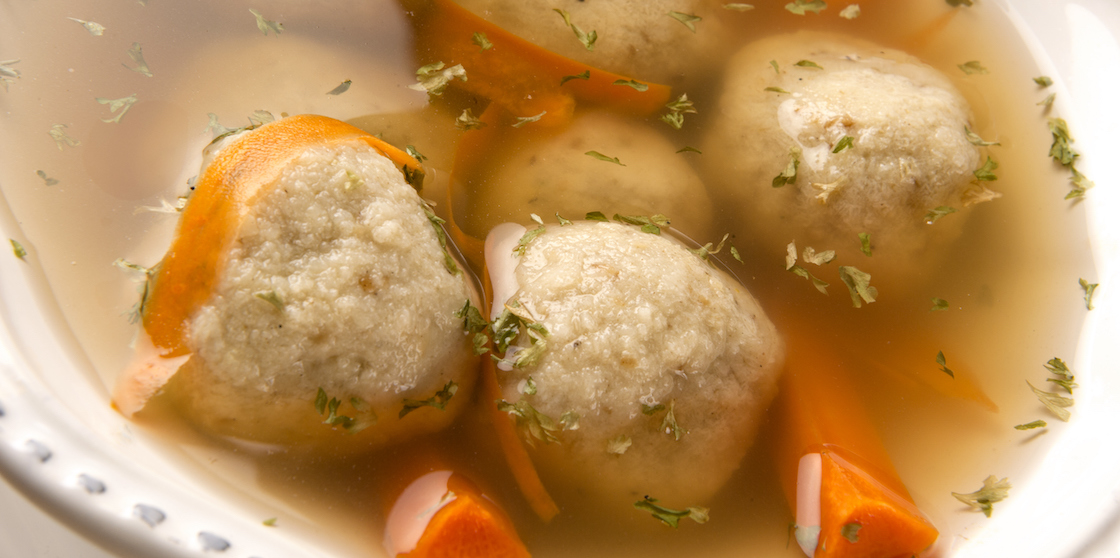Every journey is more fun when you're together. Grab your friends and hit the road in style in the Chevy Trax.

Passover is right around the corner, meaning that for those who celebrate, it’s time to once again bust out the old family cookbook, or head over to Metro Detroit’s favorite Jewish delis. For eight days, those who observe the holiday abstain from consuming any sort of leavened bread product, and as a result, turn to other ingredients – namely matzah – to fill the starchy void. The result is phenomenal dishes that, oftentimes, only see the light of day for about a week each spring.
This week, we’re highlighting some traditional Passover dishes that Metro Detroiters look forward to each year.
Matzah Ball Soup
There is perhaps no dish as paramount to the Passover experience as matzah ball soup. Affectionately referred to as Jewish penicillin, it is lauded for its healing properties in times of sickness, but also for its role in American Jewish tradition. The soup is based on chicken stock, similar to that of a classic chicken soup, but in place of noodles, matzah balls are added for starch. As the matzah balls bathe in the broth, they soften, resulting in a spoon-cuttable delicacy that, while simple, satisfies year-long cravings. Often you’ll find the addition of carrots and celery, along with spices to add complexity to the dish.
Many families choose to prepare the dish from scratch, but if you’re in a bind for time, most delis throughout Metro Detroit serve up a delicious variation. For the time-tested, community-approved selections, rely on the Three S’s: Stage Deli, Star Deli, and Steve’s Deli.
Oven-Roasted Brisket
While not written into Paesadic law, you’re likely to find a brisket amongst the various entrees featured at a Seder (Passover dinner ritual). While most are familiar with this fatty cut in the context of barbeque, many are unfamiliar with this equally, if not more delectable method of preparation.
Traditions vary. Often, you’ll find a flat-cut brisket with the fat still intact, submerged in a beef-based stock and surrounded by potatoes and root vegetables. Other times, you’ll find a drier presentation. Families are often loyal to their specific recipe, as more often than not, it’s been passed down for generations.
Stage Deli and Steve’s Deli both keep theirs on the menu year-round, but there’s no better time to order it than during the days of Passover.
Matzah Brie
During the time of Passover, matzah brie is THE breakfast of champions. While it may not be found on restaurant menus, home preparation is simple: take pieces of matzah – either whole or crumbled – soak in water, and then bathe them in egg and milk. Fry it up the same way you would some scrambled eggs, and voila!
Because of the neutral ingredients, there are various ways to go about eating it. Some take the savory route, mixing in salt, pepper, and even adding ketchup. Others go in the french toast direction, adding maple syrup or jam for a sweet and starchy breakfast treat. Those who wish to take the dish to the next level might consider leaving the matzah whole, and using the fried result for sandwich “bread.” Give them all a try. You really can’t go wrong with this one.
Gefilte Fish
Gefilte fish is one of the more unique culinary ventures of the Passover experience. Originally a product of Eastern European tradition, it can be found at nearly every Passover Seder in the United States. The dish is made by combining matzah meal with deboned and ground white fish. Usually, some combination of carrots, onion, and celery are also added to the mix. Gefilte fish is generally served cold or at room temperature as an appetizer prior to the larger dishes.
You can find jarred variations in the kosher food aisle of most major grocery stores. But if you want the real deal, it’s best to acquire it at a Jewish deli (again, start with the 3 S’s: Stage, Steve’s, Star), or try making it yourself.




